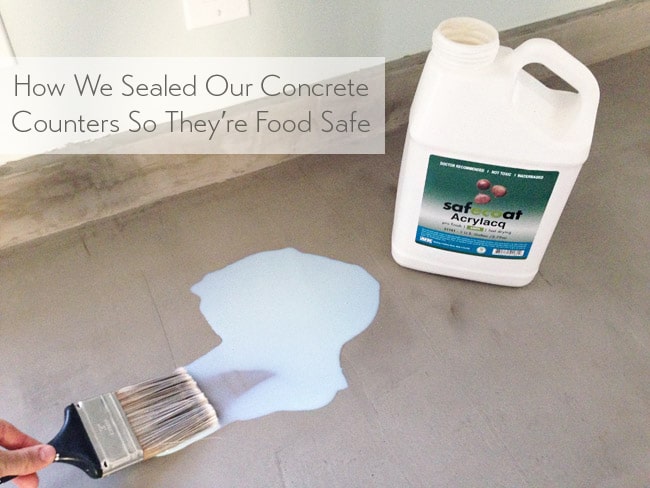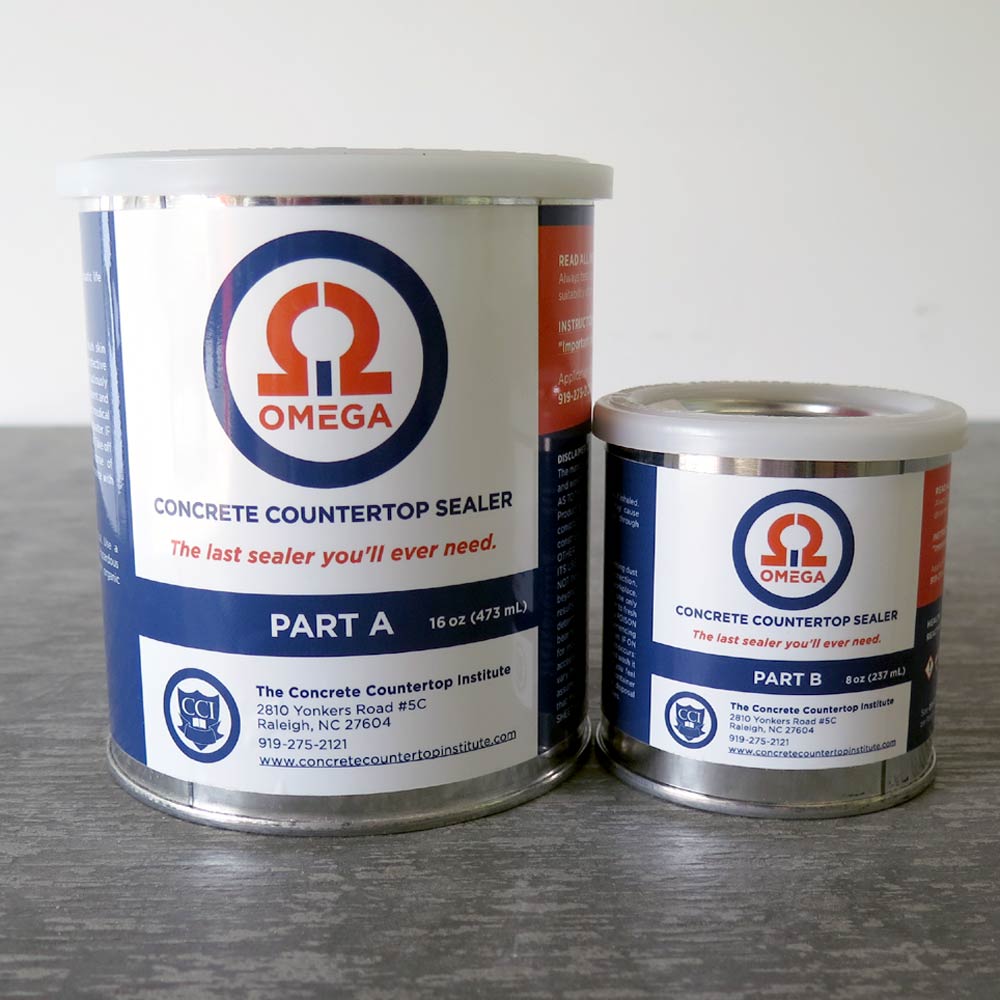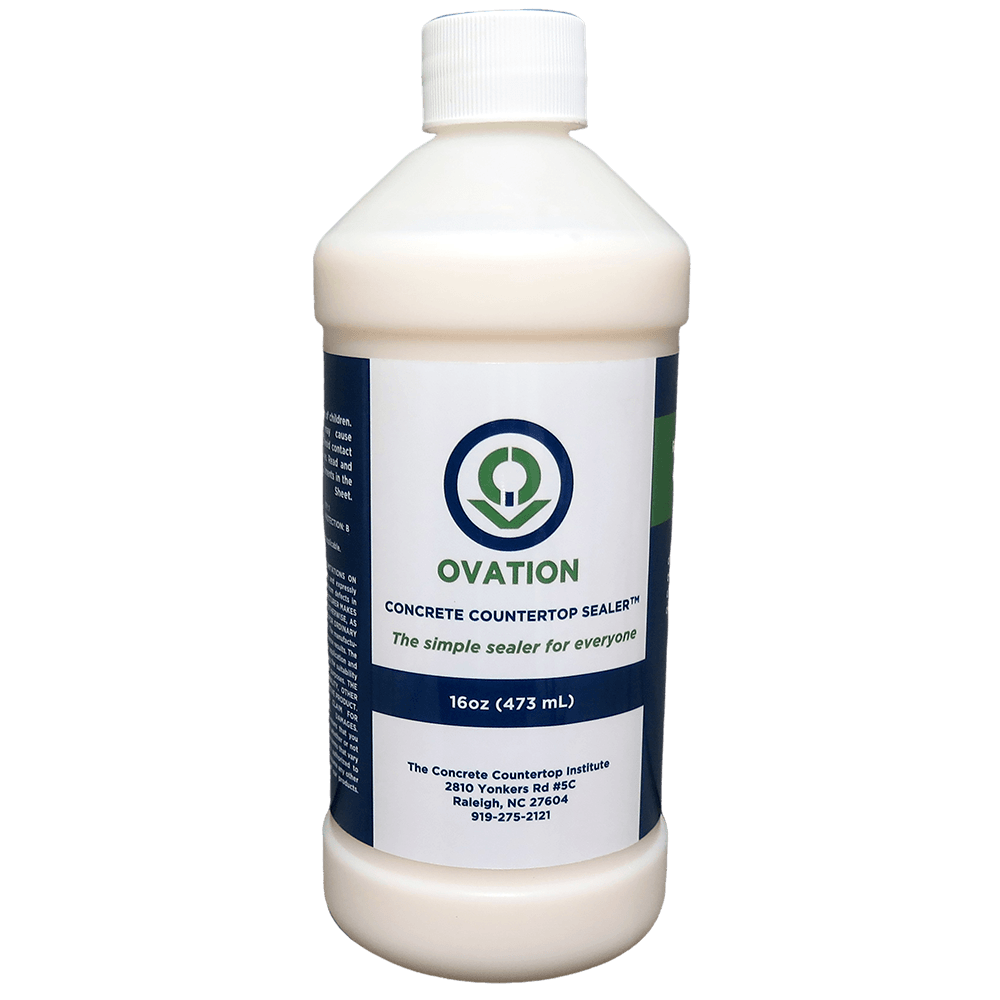Protecting Your Surfaces with Confidence
Concrete countertops have surged in popularity for their modern aesthetic and durability. To maintain their beauty and functionality, it’s crucial to seal them properly, especially in kitchen environments where they come into contact with food. A food-safe sealer for concrete countertops provides a protective barrier against stains, spills, and bacterial growth while preserving the natural look and feel of the concrete. Let’s talk more about concrete countertop sealers, exploring their benefits, types, and application methods.
The Importance of a Food-Safe Sealer
Concrete is a porous material that can absorb liquids and harbor bacteria if left unsealed, making it essential to protect it with a food-safe sealer. A food-safe sealer creates a non-porous barrier that prevents moisture, oils, and food particles from penetrating the surface of the concrete, reducing the risk of staining, discoloration, and bacterial growth. Additionally, a properly sealed concrete countertop is easier to clean and maintain, enhancing its longevity and preserving its appearance for years to come.
When selecting a food-safe sealer for concrete countertops, it’s essential to choose a product that complies with FDA regulations and is specifically formulated for use in food preparation areas. Look for sealers that are non-toxic, odorless, and free of harmful chemicals that may leach into food or affect the taste and safety of your meals. Additionally, consider factors such as durability, ease of application, and compatibility with the concrete substrate to ensure optimal performance and long-lasting protection.

Types of Food Safe Sealers for Concrete Countertops
There are several types of food-safe sealers available for concrete countertops, each with its unique characteristics and application methods. Common options include acrylic sealers, epoxy coatings, and penetrating sealers. Acrylic sealers form a protective film on the surface of the concrete, offering excellent stain resistance and UV protection. They are easy to apply and dry quickly, making them a popular choice for DIY enthusiasts.
Epoxy coatings provide a durable, high-gloss finish that is resistant to stains, scratches, and chemical damage. They create a thick, impermeable barrier that seals the concrete and enhances its appearance. Epoxy coatings are typically applied in multiple layers and require careful surface preparation to ensure proper adhesion and long-term performance.
Penetrating sealers, also known as impregnating sealers, penetrate into the pores of the concrete, forming a chemical bond that repels water and oil-based stains. They provide invisible protection without altering the appearance or texture of the concrete, making them ideal for maintaining a natural, matte finish. Penetrating sealers are breathable and allow moisture vapor to escape, preventing trapped moisture and potential damage to the concrete over time.

Application Techniques for Food Safe Sealers
Proper application of a food-safe sealer is essential to ensure effective protection and long-lasting performance for your concrete countertops. Begin by thoroughly cleaning the countertop surface to remove any dirt, grease, or residue. Allow the concrete to dry completely before applying the sealer to ensure optimal adhesion and penetration.
Follow the manufacturer’s instructions for mixing and applying the sealer, and use a high-quality brush, roller, or sprayer for even coverage. Apply the sealer in thin, uniform coats, working in small sections to prevent pooling or uneven buildup. Allow each coat to dry completely before applying additional coats, and lightly sand between coats to ensure a smooth finish.
Once the sealer has been applied, allow it to cure according to the manufacturer’s recommendations before using the countertop. Avoid placing heavy objects or exposing the surface to water or abrasion during the curing process to prevent damage to the freshly sealed concrete. With proper application and care, your concrete countertops will be protected and ready to withstand the rigors of daily use in your kitchen.
Maintenance and Care for Sealed Concrete Countertops
Maintaining sealed concrete countertops is relatively simple and requires regular cleaning and occasional resealing to preserve their appearance and performance. Clean the surface regularly with a mild detergent and water to remove dirt, grease, and food residue. Avoid harsh chemicals or abrasive cleaners that may damage the sealer or dull the finish of the concrete.
Periodically check the condition of the sealer and reapply as needed to maintain its protective properties. Signs that your concrete countertops may need to be resealed include water absorption, dullness, or staining that cannot be removed with cleaning. Follow the manufacturer’s recommendations for resealing frequency and application methods to ensure optimal results and long-term protection for your countertops.

Common Mistakes to Avoid When Using Food Safe Sealers for Concrete Countertops:
Skipping Surface Preparation: Failing to properly clean and prepare the concrete surface before applying the sealer can lead to adhesion issues and compromised performance. Thoroughly clean the countertop and allow it to dry completely before sealing to ensure optimal results.
Overlooking Compatibility: Not all sealers are compatible with all types of concrete, especially decorative or integrally colored concrete. Ensure that the sealer you choose is compatible with your specific concrete substrate to avoid compatibility issues and potential damage to the countertop.
Applying Too Much or Too Little Sealer: Applying an excessive amount of sealer can lead to pooling, streaking, and a sticky residue on the surface of the countertop, while applying too little may result in inadequate protection against stains and moisture. Follow the manufacturer’s recommendations for proper application techniques and coat thickness to achieve optimal results.
Neglecting Regular Maintenance: Proper maintenance is essential for preserving the appearance and performance of sealed concrete countertops. Neglecting regular cleaning and resealing can lead to staining, discoloration, and deterioration of the sealer over time. Establish a routine maintenance schedule and follow manufacturer recommendations to keep your countertops looking their best.

Are all sealers suitable for use on concrete countertops?
No, not all sealers are suitable for use on concrete countertops, especially in food preparation areas. It’s essential to choose a food-safe sealer specifically formulated for use on concrete countertops to ensure safety and compliance with FDA regulations.
How long does a food-safe sealer last on concrete countertops?
The lifespan of a food-safe sealer on concrete countertops depends on factors such as usage, maintenance, and environmental conditions. Generally, sealers may last anywhere from one to five years before requiring reapplication.
Can I use a food-safe sealer on decorative or integrally colored concrete countertops?
Yes, many food-safe sealers are compatible with decorative or integrally colored concrete countertops. However, it’s essential to choose a sealer that is specifically formulated for use on colored concrete to avoid altering or compromising the appearance of the countertop.
Can I apply multiple layers of sealer to enhance protection?
Yes, applying multiple layers of sealer can enhance protection and durability for concrete countertops, especially in high-traffic or food preparation areas. However, it’s crucial to follow the manufacturer’s recommendations for application and curing times to ensure optimal results.
Is it necessary to reseal concrete countertops regularly?
Yes, regular resealing is necessary to maintain the protective properties of the sealer and preserve the appearance of concrete countertops over time. Follow the manufacturer’s recommendations for resealing frequency and application methods to ensure long-lasting performance.

Sealing The Deal (And Our Concrete Counters) Young House Love

Omega Concrete Countertop Sealer

Ovation Concrete Countertop Sealer

Concrete Countertop Sealer Semi-Gloss Finish Food Safe Water Based

CHENG Concrete Countertop Sealer Remover

Related articles:
- Concrete Countertops Outdoor Kitchen
- How To Stain Concrete Countertops
- DIY Concrete Countertop Mix
- Concrete Countertops Made Easy
- Concrete Countertop Overlay
- Black Concrete Countertops
- Marble Look Concrete Countertops
- Light Grey Concrete Countertops
- Concrete Countertop Design Ideas
- Light Colored Concrete Countertops